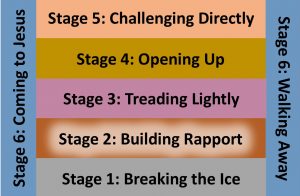 When I was a boy, a lady came to our door selling World Book encyclopedias. My mother invited her in. Rather than diving right in to her sales pitch, she wisely built rapport by asking me what school subjects I found most interesting. She expressed interest in them, too.
When I was a boy, a lady came to our door selling World Book encyclopedias. My mother invited her in. Rather than diving right in to her sales pitch, she wisely built rapport by asking me what school subjects I found most interesting. She expressed interest in them, too.
When she finally got into her presentation, guess which World Book articles she showed us first.
Experienced Jehovah’s Witnesses do something very similar. When they come into your home for the first hour-long meeting, they sound you out to see what you’re most concerned about. Is it terrorism? Crime? The environment? Uncertain finances? The job market? Bullying your children face at school? Fear of death?
Whatever it is, they will empathize with you. When they decide it’s time to move into their presentation, they will tell you that Jehovah cares about these matters as well and that soon he will step in and solve these problems.
I recommend that you build rapport with them as well. You hope to get into some pretty deep spiritual discussions later on. They need to know that you care about them as people so they will keep coming back despite disagreements over doctrine.
Ask them how long they have been Jehovah’s Witnesses. Were they born into the religion or did they join as converts? How often do they go door-to-door? That will tell you a lot about them right there. If they say they go out witnessing a couple hours a month, that’s about average. The more time they put in, the more committed and experienced they are likely to be.
Which one has been a Witness longer? Who devotes more hours to witnessing? Observe which one takes the lead. That will tell you which one is likely to dominate. Perhaps the other one is a trainee, not so thoroughly indoctrinated yet. When you do get into spiritual discussions, be sure to involve the more reserved one in the process. You want to get through to both Witnesses, not just one.
Ask them how they are received as they go door-to-door. Are most people friendly? Antagonistic? Curious? This will tell you what life is like for them—or at least how they want to come across to you. If they tell you about hostile reactions they have received, empathize with them and tell them that you think we should all show respect for each other even if we disagree about matters of religion.
Get to know them as people. Ask about their jobs and their families. Disclose similar information about yourself. The more you can connect with them as people, the better. As someone once said, people don’t care what you know unless they first know that you care.
Ask them if they believe the Bible’s is God’s inspired and infallible Word. They will tell you that they do. Tell them you believe that as well. Ask them if their religion has other books they consider to be equal to the Bible, similar to the Mormons and the Book of Mormon. They will tell you no. Agree with them on that as well.
Most likely, they will try to get you to agree to a “free home Bible study.” Smile and ask them what book of the Bible you would be studying first—one of the gospels, maybe. Or perhaps an epistle. Romans? Galatians?
This will make them somewhat uncomfortable. They have no intention of engaging in that sort of Bible study. They really want to start you on a study of a Watchtower book that teaches Watchtower doctrines.
Try to reach agreement on the format you will follow. Will it be a genuine Bible study or a Watchtower book study? Will it be an inductive study (verse-by-verse) or a topical study? What topics will you cover?
Here you will need to be flexible. It would be far better if they would agree to examine the Bible without Watchtower literature to tell them what the Bible supposedly means. However, many Witnesses will break off further discussions with you rather than take that step.
How well prepared are you? How well do you know your Bible? How well do you already understand what the Watchtower teaches? These are all factors to take into account when deciding how you will proceed.
If your Bible knowledge or understanding of Watchtower doctrine is poor, then take some time and study up before you get into doctrinal discussions with the Witnesses. You should assume that the Witnesses will be well-prepared for your discussions. You will need to be well-prepared as well.
Your turn:
Have you ever tried to get into controversial doctrinal discussions with Jehovah’s Witnesses without taking enough time to build rapport with them first? What would you do differently next time?
Share your thoughts in the comments.
Coming next: Guest Post by Michael Clark on Building Rapport with Jehovah’s Witnesses

Leave a Reply
Be the First to Comment!